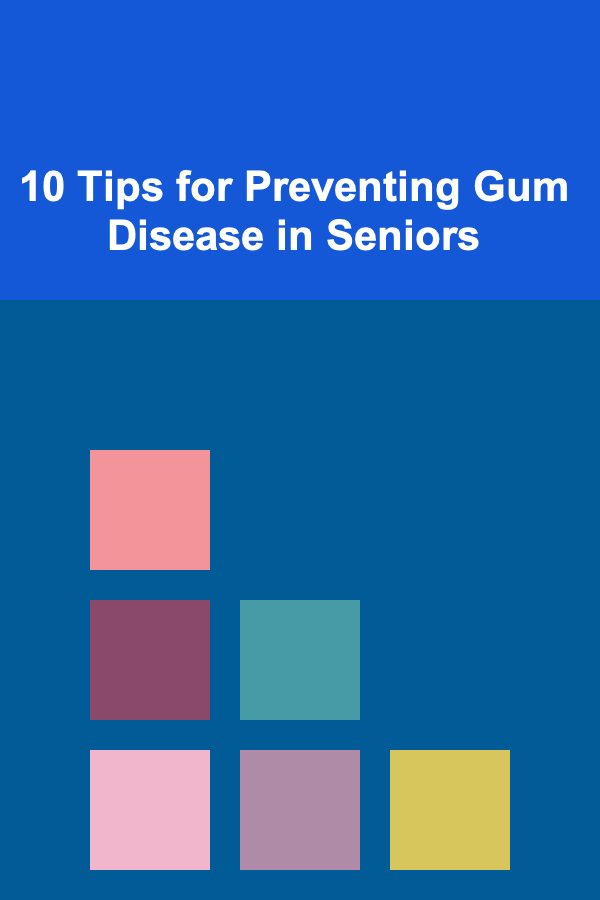
10 Tips for Preventing Gum Disease in Seniors
ebook include PDF & Audio bundle (Micro Guide)
$12.99$7.99
Limited Time Offer! Order within the next:

As we age, our bodies undergo various changes that affect our health. One of the most common and overlooked aspects of aging is dental health, particularly gum health. Gum disease, also known as periodontal disease, is a significant concern for seniors. According to the Centers for Disease Control and Prevention (CDC), nearly 70% of adults aged 65 or older have some form of gum disease. This condition can lead to tooth loss, systemic health issues, and a decrease in overall quality of life.
Fortunately, gum disease is preventable. With the right approach to oral hygiene and regular care, seniors can protect their gums and maintain their oral health for years to come. This article offers 10 practical tips to help prevent gum disease in seniors.
Brush Your Teeth Twice a Day
Brushing your teeth is the most fundamental step in preventing gum disease. For seniors, it's essential to brush at least twice a day---once in the morning and once before bed. Using a soft-bristled toothbrush and fluoride toothpaste helps remove plaque and food particles that contribute to gum disease.
When brushing, ensure that you gently brush all surfaces of your teeth, including the fronts, backs, and chewing surfaces. Also, don't forget to brush your tongue, as bacteria can accumulate there and contribute to bad breath and gum issues.
Tip: If you have arthritis or other conditions that make gripping a toothbrush difficult, consider using an electric toothbrush with an ergonomic handle or a brush with a larger grip to make brushing easier.
Floss Daily to Remove Plaque
Plaque, a sticky film of bacteria, is the leading cause of gum disease. While brushing removes plaque from the surfaces of your teeth, flossing is necessary to remove plaque between your teeth and along the gum line---areas that your toothbrush cannot reach.
Flossing should be done gently and with care. Avoid snapping the floss between your teeth, as this can damage your gums. Instead, guide the floss gently between your teeth and curve it around each tooth to ensure thorough cleaning.
Tip: If traditional flossing is difficult, consider using floss picks or water flossers. These tools can be easier to handle and can provide effective plaque removal.
Visit Your Dentist Regularly
Regular dental checkups are essential for preventing and detecting gum disease in its early stages. Seniors should visit their dentist at least once every six months, or more frequently if recommended by their dentist. During these visits, your dentist will perform a thorough examination of your gums, check for signs of gum disease, and provide professional cleaning to remove plaque and tartar buildup.
Regular visits to the dentist can help identify early signs of gum disease, such as redness, swelling, or bleeding gums, before they become more severe.
Tip: If you have specific concerns or conditions, such as diabetes or heart disease, inform your dentist so they can tailor your care accordingly.
Use Antibacterial Mouthwash
Mouthwash can be an effective addition to your oral hygiene routine. Antibacterial mouthwashes help reduce the bacteria in your mouth that contribute to plaque buildup and gum disease. Look for mouthwashes that are alcohol-free and designed for gum health, as these will be gentler on your oral tissues while still providing effective protection.
Mouthwash should be used after brushing and flossing to ensure that bacteria are removed from all areas of the mouth. Swish for 30 seconds to one minute to maximize its effectiveness.
Tip: If you have a dry mouth, which is common in seniors due to medications or aging, using a moisturizing mouthwash can help prevent further irritation and maintain hydration in your mouth.
Maintain a Healthy Diet
What you eat plays a crucial role in the health of your gums. A balanced diet rich in vitamins and minerals---especially vitamin C---can help keep your gums healthy. Vitamin C helps maintain the connective tissue in your gums, and a deficiency can increase the risk of gum disease.
Include plenty of fresh fruits and vegetables in your diet, particularly citrus fruits, bell peppers, and leafy greens. Additionally, foods rich in calcium, such as dairy products, can help keep your teeth and bones strong, supporting healthy gums.
Avoid excessive consumption of sugary foods and drinks, as sugar feeds the bacteria that cause plaque buildup and gum disease.
Tip: Drinking water throughout the day helps rinse food particles and bacteria from your mouth, reducing the risk of plaque buildup.
Quit Smoking and Avoid Tobacco Products
Tobacco use is one of the most significant risk factors for gum disease. Smoking and chewing tobacco weaken the immune system, making it harder for your body to fight off infections, including those that affect your gums. Smokers are more likely to develop gum disease and experience more severe cases of the condition than non-smokers.
If you currently smoke or use tobacco, quitting can dramatically improve your oral health and reduce the risk of gum disease. Seek support from a healthcare provider or a cessation program to help you quit.
Tip: If you need additional motivation to quit, remember that stopping smoking can also improve your overall health, reducing your risk of heart disease, cancer, and other chronic conditions.
Stay Hydrated
Dry mouth, or xerostomia, is common among seniors, especially those who take medications that reduce saliva production. Saliva is essential for maintaining oral health, as it helps wash away food particles and neutralizes acids produced by bacteria in the mouth. A lack of saliva can increase the risk of tooth decay, gum disease, and bad breath.
To combat dry mouth, drink plenty of water throughout the day. You can also chew sugar-free gum or suck on sugar-free lozenges to stimulate saliva production. Avoid alcohol and caffeine, as these can further dry out your mouth.
Tip: If dry mouth persists, talk to your dentist about treatments or products that can help. They may recommend saliva substitutes or prescribe medications to stimulate saliva production.
Manage Chronic Health Conditions
Certain chronic health conditions, such as diabetes and heart disease, can increase the risk of gum disease. Diabetes, for example, weakens the body's ability to fight infections, including gum infections, and can make gum disease more severe.
If you have a chronic condition, managing it effectively can help protect your oral health. Keep your blood sugar levels under control if you have diabetes, follow your doctor's recommendations for managing heart disease, and stay on top of any other health conditions that could affect your gums.
Tip: Be proactive about managing your health by attending regular checkups with your healthcare provider and following their advice on maintaining your overall well-being.
Be Mindful of Medications That Affect Oral Health
Many medications commonly prescribed to seniors can cause dry mouth, increase the risk of cavities, or affect gum health. Medications for high blood pressure, allergies, depression, and anxiety, among others, can contribute to oral health problems.
If you take medications regularly, talk to your healthcare provider or dentist about how they may impact your oral health. They may recommend specific strategies, such as using fluoride toothpaste, drinking more water, or using saliva substitutes to combat dry mouth.
Tip: If you experience side effects such as dry mouth or gum irritation from your medications, discuss alternatives or adjustments with your doctor.
Pay Attention to the Signs of Gum Disease
Being proactive about gum health means paying attention to the early warning signs of gum disease. Some common symptoms include:
- Bleeding gums, especially when brushing or flossing
- Swollen or red gums
- Bad breath that doesn't go away
- Receding gums or teeth that feel loose
If you notice any of these symptoms, it's important to consult your dentist as soon as possible. Early intervention can prevent the progression of gum disease and help you maintain your oral health.
Tip: Keep a dental journal to track any changes in your oral health, such as bleeding or sensitivity, so you can address potential issues early.
Conclusion
Preventing gum disease in seniors requires a multifaceted approach that includes good oral hygiene, regular dental visits, a healthy diet, and lifestyle changes. By following the tips outlined in this article, seniors can significantly reduce their risk of gum disease, maintain healthy gums, and enjoy better overall oral health. Remember, gum disease is not an inevitable part of aging---taking proactive steps today can protect your smile for years to come.
Reading More From Our Other Websites
- [Home Rental Property 101] How to Handle Noise Complaints in Apartment Buildings
- [Organization Tip 101] How to Connect with Neighbors After Moving In
- [Toy Making Tip 101] Best Resources for Sourcing Non‑Toxic, BPA‑Free Materials for Toy Making
- [Home Holiday Decoration 101] How to Make DIY Holiday Wrapping Paper that Stands Out
- [Home Family Activity 101] Best Home Family Activities That Bring Love, Laughter, and Happiness
- [Home Party Planning 101] How to Make a Guest Seating Chart for a Seamless Party Experience
- [Home Pet Care 101] Fun and Games to Play with Your Cat
- [Home Soundproofing 101] How to Use Soundproof Paint to Reduce Noise
- [Personal Investment 101] Making Money from Deep Learning through Online Courses
- [Personal Care Tips 101] How to Use Hair Oil to Moisturize Dry, Frizzy Hair

How to Create a Checklist for Holiday Mantel and Fireplace Decorations
Read More
How to Store Protective Gear Safely and Neatly
Read More
How to Reduce Emissions from Your Diet
Read More
How to Haggle Respectfully in Markets
Read More
How To Be a Social Entrepreneur
Read More
How To Repair a Damaged Deck Board: A Comprehensive Guide
Read MoreOther Products

How to Create a Checklist for Holiday Mantel and Fireplace Decorations
Read More
How to Store Protective Gear Safely and Neatly
Read More
How to Reduce Emissions from Your Diet
Read More
How to Haggle Respectfully in Markets
Read More
How To Be a Social Entrepreneur
Read More